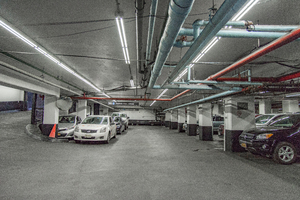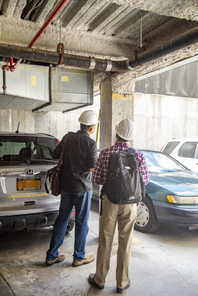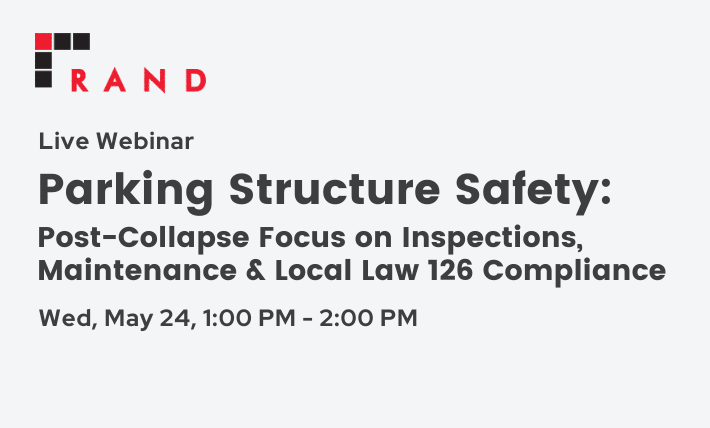 New York State’s Parking Garage Inspection Rule mandates that all parking garages must have a permit to operate, and be inspected by a qualified engineer every three years.
New York State’s Parking Garage Inspection Rule mandates that all parking garages must have a permit to operate, and be inspected by a qualified engineer every three years.
After a two-level parking garage collapsed in Johnson City, outside of Binghamton, New York in 2015, New York State amended the state code to require that owners of parking garages obtain an operating permit and conduct periodic inspections starting in 2019.
Much like New York City’s Facade Inspection Safety Program (FISP), which requires periodic facade inspections, the new rule mandates that every three years, parking garage owners have their garages inspected by a qualified engineer. Any deterioration or unsafe conditions found must be reported and remedied per the recommendation of the engineer; failure to comply can result in monetary fines and/or suspension or revocation of the parking garage’s operating permit.
Who Is Affected?
Owners of private, municipal, and state-owned parking facilities in New York State are required to comply with this new law, which covers any building or structure in which any structural level is used for parking or storage of motor vehicles, with the following exceptions:
- Buildings in which the only level used for parking or storage or motor vehicles is on grade (i.e. a parking lot)
- One- to two-family homes with an attached garage
- A townhouse unit with attached parking exclusively for that unit
What Are The Requirements?

Operating Permit
All parking garages must now have a permit to operate.
The Inspection (aka Condition Assessment)
Parking garage owners and operators must retain a qualified engineer to conduct an on-site inspection and evaluation of the parking garage. The purpose of the condition assessment is to identify evidence of deterioration of any structural element or building component, any unsafe conditions, or any indication that the structure itself is unsafe. Deterioration refers to the weakening, disintegration, corrosion, rust, or decay of any structural element or building component.
Following the initial assessment, parking garages must then undergo periodic condition assessments every three years. Additional condition assessments may be required if:
- The latest condition assessment report includes a recommendation by the engineer to perform another condition assessment for all or part of the parking garage before the next periodic condition assessment would otherwise be required.
- Any new or increased deterioration is observed and the authority having jurisdiction requires an additional condition assessment before the next periodic condition assessment would otherwise be required.
Condition Assessment Report
Following the completion of the investigation, the inspecting engineer must prepare a Condition Assessment Report, which is to include an evaluation and description of:
- Unsafe conditions
- Conditions that require prompt repair or maintenance to prevent unsafe conditions
- Any other deterioration or conditions that risk developing into unsafe conditions
- Corrective options and the recommended timeframe for remedying unsafe and potentially unsafe conditions
- Risks associated with not addressing unsafe and potentially unsafe conditions.
The report must also include:
- Recommendations regarding preventative maintenance
- Attestation that the engineer reviewed all previously prepared condition reports available
- A recommendation as to when the next condition assessment should be performed
Compliance Deadlines
New parking structures must undergo an initial condition assessment prior to obtaining a Certificate of Occupancy or Certificate of Compliance.
Existing parking structures must have completed an initial condition assessment by the following schedule:
- By October 1, 2019, if originally constructed prior to January 1, 1984
- By October 1, 2020, if originally constructed between January 1, 1984 and December 31, 2002
- By October 1, 2021, if originally constructed between January 1, 2003 and August 29, 2018.
Initial filing deadlines for existing parking structures in New York State began in 2019, with the exception of New York City, which follows its own inspection regulations.
Subsequent inspections and filings are required at least every three years after the date of an initial inspection.
Failure to Comply
In New York State, each city, town, village, county, or governmental unit/agency, also known as the “authority having jurisdiction,” is responsible for administering and enforcing the rule. Parking garage owners and operators must remedy all deterioration and unsafe conditions identified in the condition assessment report; otherwise, the authority having jurisdiction has the right to take enforcement action, including the suspension or revocation of the parking garage’s operating permit.
The New York City Exception
New York City maintains its own building code requirements, so buildings within the city boundaries are not subject to the state’s deadline.
New York City maintains its own building code requirement, so buildings within the city boundaries are not subject to the state's deadline.
As of January 1, 2022, parking structures in New York City are required to be inspected periodically per Local Law 126 of 2021, which added a new Article 323 to Title 28 of the Administrative Code. The New York City Department of Buildings (DOB) is currently in the process of establishing its own inspection requirements, deadlines, and enforcement action. More information can be found on the DOB website.
An Ounce of Prevention
Fortunately, while two dozen vehicles were crushed or trapped in the Johnson City parking garage collapse, no fatalities or injuries occurred. Because concrete and steel deterioration can rapidly accelerate due to the multiple freeze-thaw cycles New York State experiences during its harsh winters, parking garage owners should be prepared to budget for repairs when inspection results are reported. While adhering to a strict inspection and maintenance protocol may seem onerous, it can help to avoid more costly repairs in the future, prevent damage to personal property, and avert potential catastrophic failures that could lead to bodily harm or loss of life.
For more information on New York State’s Parking Garage Inspection Rule, or to schedule an inspection, contact RAND at 212-675-8844 or info@randpc.com.


